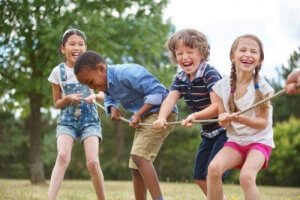The Basic Necessities of Childhood

“What are the basic necessities of childhood? What should children never be without?” These are questions that any mother or father who’s just becoming a parent for the first time might ask. Continue reading to discover what necessities are considered the pillars of healthy child development.
T. Berry Brazelton and Stanley I. Greenspan have no doubts about which necessities are the most basic in childhood. They maintain that if you cover the basic necessities of childhood, you’ll be providing a foundation on which to build intellectual, social, and emotional abilities in children.
The basic necessities of childhood
1. Security
Children should grow up in a secure and healthy environment. The notion of security encompasses all the different basic necessities that ensure our survival: clothing, shelter, nutrition, healthcare, protection, etc.
Nonetheless, security also entails the emotional part. Situations that to us adults may seem simple or insignificant can feel agonizing for children. Furthermore, it’s important that we help them understand the emotions they’re developing.
2. The basic necessities of childhood in terms of affective relationships
It’s important to educate children not just with discipline. Words and actions should promote confidence and respect. Likewise, the way that family ties are established will influence the emotional development of children.
Psychologists like Anna Freud or Erik Erikson argue that children need education or an upbringing that does more than just point out their shortcomings. In other words, their education and upbringing should build solid affective relationships that’ll make them feel secure.

In addition, Brazelton and Greenspan argue that affective dimensions like emotional interaction and warmth help the central nervous system of babies and small children to evolve. That’s to say that during infancy, the most important learning happens through contact and human interaction.
3. Stability and consistency as basic childhood necessities
Children need to receive direct and consistent instructions. That’s to say, the “good cop, bad cop” dynamic isn’t ideal. Parents should present a united front so you have a consensus about the message you’re sending your children and the values you hold together as a family.
Furthermore, children should be raised in a stable environment that they can call home. The home environment should be tranquil, affective, and understanding. Furthermore, the members of the household should work to build trusting relationships.
4. Leisure time
All children should have some daily leisure time. This necessity is as important as all the others. Leisure times lets you break from the routine and experiment with something new. Likewise, leisure time affects our moods and emotions positively and as such it relates directly with child development.
In his book called Valuable Leisure, Manuel Cuenca says that leisure time widens and strengthens our social, physical, and intellectual resources, especially in children.
5. Physical activity
Firstly, it’s becoming more and more common in recent years to come across children who have highly sedentary lifestyles. Not only has the way that children have fun changed, but also their way of relating to one another.
That is, they don’t need to leave the house to keep up with their friends because they can text and video chat with them constantly without leaving home.
Secondly, for health experts, the lack of physical activity now among children is alarming. For example, José Devís and Carmen Pieró, experts in physical education believe the absence of physical activity is a risk for cardiovascular diseases in our future generations.
Parents, teachers, and school administrators should be concerned about satisfying the basic necessity of physical activity in childhood.
Clearly, parents and teachers have the responsibility of instilling a lifestyle in children where they participate in sports and other physical activities for both their physical and mental health.
6. The basic necessities of childhood: Education
Education plays a role in our way of being and of relating to the world. Certainly, education is a human necessity. Thanks to education, we learn how to behave in society and follow the norms that make us a part of society.

From a young age, children should receive a quality education that’ll help them understand how the world works and, above all, to know how to be in this world. Certainly, education is the best tool for becoming part of society.
“The human being can only become human through education. He is nothing except what education makes out of him.”
–Kant–
In sum, there are numerous influences in children’s surroundings that are determining factors in their development. Moreover, there are endless possible things that children might need as they grow. But there’s no doubt that all children should have their basic necessities covered.
“What are the basic necessities of childhood? What should children never be without?” These are questions that any mother or father who’s just becoming a parent for the first time might ask. Continue reading to discover what necessities are considered the pillars of healthy child development.
T. Berry Brazelton and Stanley I. Greenspan have no doubts about which necessities are the most basic in childhood. They maintain that if you cover the basic necessities of childhood, you’ll be providing a foundation on which to build intellectual, social, and emotional abilities in children.
The basic necessities of childhood
1. Security
Children should grow up in a secure and healthy environment. The notion of security encompasses all the different basic necessities that ensure our survival: clothing, shelter, nutrition, healthcare, protection, etc.
Nonetheless, security also entails the emotional part. Situations that to us adults may seem simple or insignificant can feel agonizing for children. Furthermore, it’s important that we help them understand the emotions they’re developing.
2. The basic necessities of childhood in terms of affective relationships
It’s important to educate children not just with discipline. Words and actions should promote confidence and respect. Likewise, the way that family ties are established will influence the emotional development of children.
Psychologists like Anna Freud or Erik Erikson argue that children need education or an upbringing that does more than just point out their shortcomings. In other words, their education and upbringing should build solid affective relationships that’ll make them feel secure.

In addition, Brazelton and Greenspan argue that affective dimensions like emotional interaction and warmth help the central nervous system of babies and small children to evolve. That’s to say that during infancy, the most important learning happens through contact and human interaction.
3. Stability and consistency as basic childhood necessities
Children need to receive direct and consistent instructions. That’s to say, the “good cop, bad cop” dynamic isn’t ideal. Parents should present a united front so you have a consensus about the message you’re sending your children and the values you hold together as a family.
Furthermore, children should be raised in a stable environment that they can call home. The home environment should be tranquil, affective, and understanding. Furthermore, the members of the household should work to build trusting relationships.
4. Leisure time
All children should have some daily leisure time. This necessity is as important as all the others. Leisure times lets you break from the routine and experiment with something new. Likewise, leisure time affects our moods and emotions positively and as such it relates directly with child development.
In his book called Valuable Leisure, Manuel Cuenca says that leisure time widens and strengthens our social, physical, and intellectual resources, especially in children.
5. Physical activity
Firstly, it’s becoming more and more common in recent years to come across children who have highly sedentary lifestyles. Not only has the way that children have fun changed, but also their way of relating to one another.
That is, they don’t need to leave the house to keep up with their friends because they can text and video chat with them constantly without leaving home.
Secondly, for health experts, the lack of physical activity now among children is alarming. For example, José Devís and Carmen Pieró, experts in physical education believe the absence of physical activity is a risk for cardiovascular diseases in our future generations.
Parents, teachers, and school administrators should be concerned about satisfying the basic necessity of physical activity in childhood.
Clearly, parents and teachers have the responsibility of instilling a lifestyle in children where they participate in sports and other physical activities for both their physical and mental health.
6. The basic necessities of childhood: Education
Education plays a role in our way of being and of relating to the world. Certainly, education is a human necessity. Thanks to education, we learn how to behave in society and follow the norms that make us a part of society.

From a young age, children should receive a quality education that’ll help them understand how the world works and, above all, to know how to be in this world. Certainly, education is the best tool for becoming part of society.
“The human being can only become human through education. He is nothing except what education makes out of him.”
–Kant–
In sum, there are numerous influences in children’s surroundings that are determining factors in their development. Moreover, there are endless possible things that children might need as they grow. But there’s no doubt that all children should have their basic necessities covered.
All cited sources were thoroughly reviewed by our team to ensure their quality, reliability, currency, and validity. The bibliography of this article was considered reliable and of academic or scientific accuracy.
- Betancur Saladarriaga, D. C., & Cuervo Pineda, K. (2017). Identidad política: formación de sujetos políticos desde la infancia. [Trabajo de Grado, Universidad de Antioquia] Repositorio institucional. https://bibliotecadigital.udea.edu.co/handle/10495/23166
- Brazelton, T. B. (2005). Las necesidades básicas de la infancia: lo que cada niño o niña precisa para vivir, crecer y aprender (Vol. 11). Graó Ediciones. https://books.google.co.ve/books/about/Las_necesidades_b%C3%A1sicas_de_la_infancia.html?hl=es&id=V0xazG6sdpgC&redir_esc=y
- Chmiel, F. (2021) Un hogar en la constelación: espacio y afectividad en el recuerdo de la infancia en el exilio. Revista de la Red Intercátedras de Historia de América Latina Contemporánea, 14(9-2021), 1-23. https://ri.conicet.gov.ar/handle/11336/173201
- Hidalgo García, M. V., Sánchez Hidalgo, J., & Lorence Lara, B. (2008). Procesos y necesidades de desarrollo durante la infancia. XXI. Revista de Educación, 10, 85-95. https://idus.us.es/handle/11441/30963
- Maza, M. (2021). Juego, luego existo: El existenciario del jugar, Fair Play. Revista de Filosofía, Ética y Derecho del Deporte, vol. 19, p.48-77. https://www.raco.cat/index.php/FairPlay/article/view/386741
- Martínez García, R., & Caballo Villar, M. B. (2022). Educar el ocio en la sociedad apresurada: El Ocio Valioso como horizonte. Revista Ciencias Pedagógicas E Innovación, 10(2), 159-169. https://incyt.upse.edu.ec/pedagogia/revistas/index.php/rcpi/article/view/448
- Romero Escobar, H., & Romero Escobar, S. (2022). Importancia del apego y las relaciones vinculares en la terapia familiar. Revista De Psiquiatría Infanto-Juvenil, 39(2), 59–68. https://www.aepnya.eu/index.php/revistaaepnya/article/view/884
- Valencia-Peris, A., Devís-Devís, J., & Peiró-Velert, C. (2014). El uso sedentario de medios tecnológicos de pantalla: perfil sociodemográfico de los adolescentes españoles (Sedentary use of screen-media: Sociodemographic profile of Spanish adolescents). Retos, 26, 21–26. https://recyt.fecyt.es/index.php/retos/article/view/34389
This text is provided for informational purposes only and does not replace consultation with a professional. If in doubt, consult your specialist.








